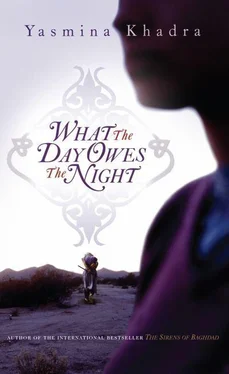I take the case, stare at the flaking design on the lid. It is an antique candy box with engravings of scenes from aristocratic life, noblemen in their gardens, princes flirting with beautiful girls in the shade of a fountain; from the weight, there cannot be much inside it.
‘I’ll come by and pick you up tomorrow at ten a.m. We’ll have lunch at the house of André Sosa’s niece in Manosque.’
‘I’ll see you at ten o’clock. And thank you.’
‘You’re welcome, Monsieur Jonas. Good night.’
He leaves.
I sit on the edge of the bed, holding the box in my hands. What postscript has Émilie left me, what message from beyond the grave? I picture again the Rue des Frères-Julien in Marseille, that day in March 1964; I can see her face, like a mask of bronze, her bloodless lips crushing my last hope of making up for lost time. My hand is trembling; the cold metal chills me to the bone. I have to open it. What difference does it make whether it is a music box or Pandora’s box? At eighty, the future is behind us; all that lies ahead is the past.
I open the tiny padlock, lift the lid: letters . . . There is nothing inside but letters. Dozens of envelopes yellowed by time and blistered by damp; others look as though they have been crumpled up and smoothed again. I recognise my handwriting on the envelopes, stamps from my own country . . . and I realise why Émilie never wrote back to me: she never opened my letters, never opened my cards.
I tip the envelopes on to the bed, check every one of them, hoping to come upon a letter from her. There is one, a recent one, still firm to the touch, with no stamp and no address, only my name written on the front, the envelope sealed with a piece of sellotape.
I cannot bring myself to open it.
Perhaps tomorrow . . .
We have lunch in Manosque, at the house of André’s niece. Here again we trot out old stories, but we are beginning to run out of steam. Another pied-noircomes to see us. When I hear his voice, I think Jean-Christophe Lamy has finally arrived and the thought breathes new life into me, only to fade just as quickly when I realise it isn’t him. The stranger stays for about an hour and then leaves. He listens to our stories but cannot make head or tail of them, and he realises that though he comes from the outskirts of Oran – from Lamorcière, near Tlemcen – he is intruding on a private conversation, disturbing something he does not understand. Bruno and Krimo are the next to go, first to Perpignan, where Krimo will spend the night at his friend’s house before crossing the border into Spain. At about four o’clock, we leave and drop Fabrice at the TGV station outside Aix-en-Provence.
‘Do you really have to go back tomorrow?’ Fabrice asks. ‘Hélène would love to see you. Paris is only three hours by train; you could fly back to Algeria from Orly. I live near the airport.’
‘Some other time, Fabrice. Give Hélène my love. Is she still writing?’
‘She retired a long time ago.’
The train pulls in, a magnificent beast. Fabrice hops up on to the step, hugs me one last time, and goes to find his seat. The train pulls off, moving away slowly. I crane my neck to see Fabrice through the carriage windows, and there he is, standing, one hand raised in a salute. Then the train sweeps him away.
Back in Aix, Gustave offers to take us to Les Deux Garçons. After dinner, we stroll up the Cours Mirabeau. The weather is mild, the café terraces are still full, young people are queuing outside the cinemas. A dishevelled musician is sitting in the middle of the esplanade retuning his violin, his dog curled up next to him.
Outside my hotel, two pedestrians and a driver are yelling at each other. Having run out of arguments, the driver climbs back into his car, slamming the door behind him.
My friends leave me in the capable hands of the receptionist and promise to pick me up at seven a.m. to drop me at the airport.
I take a hot shower and slip into bed.
On the nightstand is Émilie’s box, as immutable as a funerary urn. My hand automatically reaches out and unfastens the padlock, but does not dare lift the lid.
I can’t get to sleep. I try to clear my mind. I hug the pillows, turn on to my left side, on to my back. I feel miserable. Sleep isolates me and I don’t want to be alone in the dark. A private conversation with myself does not appeal. I need to be surrounded by courtiers, to share my frustrations, to designate scapegoats. When you can’t find a remedy for your pain, you look for someone to blame. My pain is nebulous. I feel a sadness, but I can’t put my finger on the cause. Émilie? Jean-Christophe? Old age? The letter waiting for me in the box? Why didn’t Jean-Christophe come? Does he still bear me that ancient grudge?
Through the window, which is open on to the deep blue sky where the moon glitters like a medal, I prepare myself to watch, in slow motion, the parade of my misdeeds, my joys, the familiar faces. I hear them arrive, a thunderous roar like a rockslide. How should I sort them? How should I behave? I am going round in circles on the edge of an abyss, an acrobat on a razor’s edge, a mesmerised volcanologist on the edge of a bubbling crater; I am at the gates of memory, the endless reels of film we all file away, the great dark drawers stocked with the ordinary heroes we once were, the Camusian myths we never could embody, the actors and the roles we played, genius and grotesque, beautiful and monstrous, bowed beneath the weight of our small acts of cowardice, our feats of arms, our lies, our confessions, our oaths and recantations, our gallantry and desertion, our certainties and doubts; in short, our indomitable illusions. What to keep of all these reels of film, what to throw away? If we could take only one memory on our journey, what would we choose? At the expense of what or whom? And most importantly, how to choose among all these shadows, all these spectres, all these titans? Who are we, when all is said and done? Are we the people we once were or the people we wish we had been? Are we the pain we caused others or the pain we suffered at the hands of others? The encounters we missed or those fortuitous meetings that changed the course of our destiny? Our time behind the scenes that saved us from our vanity or the moment in the limelight that warmed us? We are all of these things, we are the whole life that we have lived, its highs and lows, its fortunes and its hardships; we are the sum of the ghosts that haunt us . . . we are a host of characters in one, so convincing in every role we played that it is impossible for us to tell who we really were, who we have become, who we will be.
I listen to the voices of the past; I am no longer alone. Whispers whirl in these splinters of memory like fragments of a vast sound: cryptic phrases, strangled cries, laughter and sobbing impossible to tell apart . . . I can hear Isabelle playing the piano – Chopin – see her slender fingers moving nimbly over the keyboard; I seek out her face, which I imagine tense with blissful concentration; but the image does not change, it remains fixed on the piano keys as the notes explode in a ballet of fireworks . . . My dog appears from behind a hill, eyebrows like circumflexes, a mournful expression. I reach out to stroke him; the gesture is absurd, yet I do it nonetheless. My fingers slip over the bedspread as over fur. I allow these memories to take possession of my breathing, my insomnia, my whole being. I see our shack again, on the side of a dirt track that is fading away . . . I am the child I once was. We do not have a second childhood – we never truly emerge from the first. Am I old? What is an old man but a child who has amassed time and flab? My mother is running down the little hill, her feet raising dust into a thousand constellations. Maman, my darling Maman. . . A mother is not merely a person, nor a unique being, nor even an epoch; a mother is a presence that neither time nor failing of memory can alter. I am the proof; every day God sends, every night when I crawl under the sheets, I knowthat she is here, that she has been here beside me through the years, the fruitless prayers, the unfulfilled promises, the unbearable absences, all this futility . . . Farther off, crouched by a mound of stones, a straw hat pushed down on his head, my father watches the breeze caress the slender stalks of wheat on the blade . . . then everything spins out of control: the fire raging through our fields, the kaidarriving in his barouche, the cart that brought us to a place where there was no room for my dog . . . Jenane Jato . . . the barber singing, Peg-Leg, El Moro, Ouari and his goldfinches . . . Germaine opening her arms wide as my uncle watched tenderly . . . then Río Salado, always, forever, Río Salado . . .
Читать дальше












